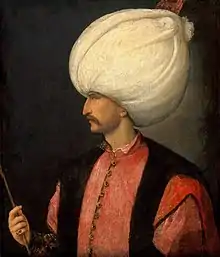سلطان
Arabic

Suleiman I of the Ottoman Empire
Etymology
From the root س ل ط (s-l-ṭ). Cognates with Aramaic שׁוּלְטָנָא / ܫܘܼܠܛܵܢܵܐ (šulṭānā, “power”).
Pronunciation
- IPA(key): /sul.tˤaːn/
Noun
سُلْطَان • (sulṭān) m or f (usually uncountable)
- power, strength
- rule, dominion
- authority
-
- إِنْ هِيَ إِلَّا أَسْمَاءٌ سَمَّيْتُمُوهَا أَنْتُمْ وَآبَاؤُكُم مَا أَنْزَلَ اللَّهُ بِهَا مِن سُلْطَانٍ إِن يَتَّبِعُونَ إِلَّا الظَّنَّ وَمَا تَهْوَى الأَنْفُسُ وَلَقَدْ جَاءَهُم مِن رَبِّهِمُ الهُدَى
- ʔin hiya ʔillā ʔasmāʔun sammaytumūhā ʔantum wa-ʔābāʔukum mā ʔanzala l-lahu bihā min sulṭānin ʔin yattabiʕūna ʔillā ẓ-ẓanna wa-mā tahwā l-ʔanfusu wa-laqad jāʔahum min rabbihimu l-hudā
- These are but names which you have coined—you and your fathers—for which God has not sent down any authority. They follow nothing but conjectures and the desires of the [lower] soul, while there has already come to them the guidance from their Lord.
-
- mandate, authorization
- proof, evidence, an argument or case against
- a plea, an allegation, the grounds or basis for one's case being superior
- justification
Declension
Declension of noun سُلْطَان (sulṭān)
| Singular | basic singular triptote | ||
|---|---|---|---|
| Indefinite | Definite | Construct | |
| Informal | سُلْطَان sulṭān |
السُّلْطَان as-sulṭān |
سُلْطَان sulṭān |
| Nominative | سُلْطَانٌ sulṭānun |
السُّلْطَانُ as-sulṭānu |
سُلْطَانُ sulṭānu |
| Accusative | سُلْطَانًا sulṭānan |
السُّلْطَانَ as-sulṭāna |
سُلْطَانَ sulṭāna |
| Genitive | سُلْطَانٍ sulṭānin |
السُّلْطَانِ as-sulṭāni |
سُلْطَانِ sulṭāni |
Declension
Declension of noun سُلْطَان (sulṭān)
| Singular | basic singular triptote | ||
|---|---|---|---|
| Indefinite | Definite | Construct | |
| Informal | سُلْطَان sulṭān |
السُّلْطَان as-sulṭān |
سُلْطَان sulṭān |
| Nominative | سُلْطَانٌ sulṭānun |
السُّلْطَانُ as-sulṭānu |
سُلْطَانُ sulṭānu |
| Accusative | سُلْطَانًا sulṭānan |
السُّلْطَانَ as-sulṭāna |
سُلْطَانَ sulṭāna |
| Genitive | سُلْطَانٍ sulṭānin |
السُّلْطَانِ as-sulṭāni |
سُلْطَانِ sulṭāni |
| Dual | Indefinite | Definite | Construct |
| Informal | سُلْطَانَيْن sulṭānayn |
السُّلْطَانَيْن as-sulṭānayn |
سُلْطَانَيْ sulṭānay |
| Nominative | سُلْطَانَانِ sulṭānāni |
السُّلْطَانَانِ as-sulṭānāni |
سُلْطَانَا sulṭānā |
| Accusative | سُلْطَانَيْنِ sulṭānayni |
السُّلْطَانَيْنِ as-sulṭānayni |
سُلْطَانَيْ sulṭānay |
| Genitive | سُلْطَانَيْنِ sulṭānayni |
السُّلْطَانَيْنِ as-sulṭānayni |
سُلْطَانَيْ sulṭānay |
| Plural | basic broken plural diptote | ||
| Indefinite | Definite | Construct | |
| Informal | سَلَاطِين salāṭīn |
السَّلَاطِين as-salāṭīn |
سَلَاطِين salāṭīn |
| Nominative | سَلَاطِينُ salāṭīnu |
السَّلَاطِينُ as-salāṭīnu |
سَلَاطِينُ salāṭīnu |
| Accusative | سَلَاطِينَ salāṭīna |
السَّلَاطِينَ as-salāṭīna |
سَلَاطِينَ salāṭīna |
| Genitive | سَلَاطِينَ salāṭīna |
السَّلَاطِينِ as-salāṭīni |
سَلَاطِينِ salāṭīni |
Descendants
- Maltese: sultan
- Borrowings
- → Afar: súltaan
- → Azerbaijani: sultan
- → Georgian: სულთანი (sultani)
- → German: Sultan
- → Estonian: sultan
- → Walloon: zultan
- → Hebrew: סוּלְטָן
- → Icelandic: soldán
- → Italian: sultano
- → Japanese: スルターン (surutān)
- → Korean: 술탄 (sultan)
- → Kyrgyz: султан (sultan)
- → Malay: سلطان / sultan
- → Maranao: solutan
- → Medieval Latin: sultānus
- → Middle Armenian: սուլթան (sultʿan)
- Armenian: սուլթան (sultʿan)
- → Northern Kurdish: sultan
- → Ottoman Turkish: سلطان (sultan) (see there for further descendants)
- → Persian: سلطان (soltân) (see there for further descendants)
- → Russian: султан (sultan)
- → Swahili: sultani
- → Tajik: султон (sulton)
- → Tausug: sultan
- → Thai: สุลต่าน (sǔn-lá-dtàan)
- → Yiddish: סולטאַן (sultan)
Malay
Alternative forms
Pronunciation
- IPA(key): /sul.taːn/
Noun
سلطان (plural سلطان٢, informal 1st possessive سلطانکو, 2nd possessive سلطانمو, 3rd possessive سلطانڽ)
Further reading
- “سلطان” in Pusat Rujukan Persuratan Melayu | Malay Literary Reference Centre, Kuala Lumpur: Dewan Bahasa dan Pustaka, 2017.
Ottoman Turkish
Descendants
- Turkish: sultan
- Borrowings
- → Byzantine Greek: σουλτᾶνος (soultânos)
- Greek: σουλτάνος (soultános)
- → Catalan: sultà
- → Czech: sultán
- → Danish: sultan
- → Dutch: sultan
- → Hungarian: szultán
- → Latvian: sultāns
- → Macedonian: султан (sultan)
- → Middle French: sultan (see there for further descendants)
- → Norwegian: sultan
- → Polish: sułtan
- → Romanian: sultan
- → Serbo-Croatian: sultan / султан
- → Slovak: sultán
- → Slovene: sultan
- → Spanish: sultán
- → Swedish: sultan
- → Finnish: sulttaani
References
- Kélékian, Diran (1911), “سلطان”, in Dictionnaire turc-français, Constantinople: Mihran, page 689
- Redhouse, James W. (1890), “سلطان”, in A Turkish and English Lexicon, Constantinople: A. H. Boyajian, page 1072
Persian
Pronunciation
- (Classical Persian) IPA(key): /sulˈtɑːn/
- (Dari Persian) IPA(key): /sʊlˈtɑːn/
- (Iranian Persian) IPA(key): /solˈtɒːn/
- (Tajik) IPA(key): /sulˈtɔn/
Related terms
- سلطانه (soltâne)
Descendants
Sindhi
References
- Parmanand, Mewaram (1910), “سلطان”, in Sindhi-English Dictionary (in English), Hyderabad, Sindh: The Sind Juvenile Co-operative Society
Urdu
Etymology
Borrowed from Classical Persian سلطان (sultān), from Arabic سُلْطَان (sulṭān).
Pronunciation
- (Standard Urdu) IPA(key): /sʊl.t̪ɑːn/
- (Deccani) IPA(key): /sʊl.t̪ɑːn/
- Rhymes: -ɑːn
This article is issued from Wiktionary. The text is licensed under Creative Commons - Attribution - Sharealike. Additional terms may apply for the media files.